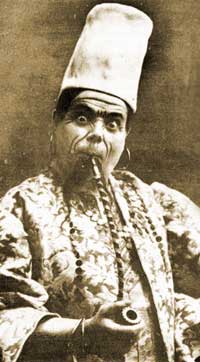|
Pablo Luna Teatro de la
Zarzuela |
|
Not the least intriguing aspect of this important revival is the lie it gives to the notion that Luna's style is closer to continental operetta than to Madrid sainete. The truth is that though his El asombro de Damasco draws on many strands of music theatre - the grace of Sullivan (who set the same story in The Rose of Persia,) the broader comedy of his successor Lionel Monckton, Puccini's sensuality, and most unexpectedly the romantic exoticism of Grieg - operetta it most assuredly ain't! Two acts there may be, but the spirit is pure género chico, infinitely closer to Chueca than to Fall, Lehár or Kálmán. The libretto may be a frivolous slice of 1001 Nights sweetmeat, but Luna's sophisticated musical seasoning harmonises his diverse ingredients into a dish of rich colour, personality and beauty.
|
The line of descent from Chueca is emphasised in Jesús Castejón's production, which chooses the path of sex comedy rather than fairy-tale romance. Settings and costumes are a luxuriant riot of colour, but refreshingly in Moorish Classic not Hollywood Sensual Silk mode. This is Carry On Caliph not The Thief of Baghdad, an actors' not a singers' show, and much of the comedy works tightly and well. Rafa Castejón's daintily perverse Ali-Mon is spellbinding, counterpointed by Miguel Sola's broader, belly-flopping Ben-Ibhem; whilst Eduardo O. Carranza's eunuch cook and Antonio Resino's slinking, tongue-slit henchman also hit the mark. Nuria Castejón's choreography is equally successful in pointing up the camp, with a particularly neat line in gender-bending for the Cadi's limp guards and Fahima's feline, female cohorts. |
|
If you think there's a "but" coming, you're right. What's spent on the comedy swings leaves an empty purse for the romantic roundabouts. Castejón's alteration of the ending crystallises the matter. When harrassed heroine Zobeida asks her rescuer how she can repay his kindness, the Caliph (Abel García) smartly asks her to visit him later that night. The change from noble deus-ex-machina to facetious sexual predator is significant. Zobeida herself oscillates between virtuous wife and brazen sex-kitten, a schizoid combination which works well enough from moment to moment but makes it hard for us to care much about her in the long run. María Rey-Joly is a strong performer, distinctive of voice and personality, but here she looks and sounds too uncomfortable to project the character consistently. José Antonio López takes the vocal honours with an imposing Grand Vizier, firm and lyrical of line in "Esto que pides aquí", one of Luna's most beautiful, long-breathed melodies, but he too gets lost in the breathless romp of Act 2. As perfume-seller Fahima, the "clever servant" who manufactures the plot, Carmen González brings all her experience to bear without quite capturing the freshness implicit in Luna's light soprano writing.
Though the usually impressive Zarzuela Chorus had by their own high standards something of an off night, the orchestra has rarely sounded better, with Miguel Roa teasing out all the subtle alhambrismo orientalisms of Luna's scoring to perfection. He was obviously moved as he dedicated the performance to the memory of the late Victoria de los Angeles, who had died earlier in the day.
This El asombro de Damasco does not lack magic - Luna's music and Ana Garay's design see to that - but it does have a hole in its heart. As light comedy Jesus Castejón's production is adept and entertaining, but come its well-merited revival (soon please!) maybe he'll feel confident enough in the material to allow that romantic heart to beat a little more freely. Classics are not classics for nothing, and this Eastern fairy-tale is grounded in a mysterious sense of reality over and above the oriental flimflam. Zobeida's plight has to be touching, lest Luna's charming zarzuela trickle through the head like desert sand through the fingers.
© Christopher Webber 2005
El asombro de
Damasco
zarzuela in 2 Acts
music by Pablo Luna
text by Antonio Paso
Cano and Joaquín Abati
Principals: Zobeida -
María Rey-Joly; Fahima - Carmen González; Ben-Ibhem - Miguel
Sola; Alí-Mon - Rafa Castejón; Nhuredín - José
Antonio López; Ka-Fur/El Califa - Abel García; Amarus - Eduardo
O. Carranza; Muecín - Gerardo López
dir. Jesús
Castejon; design. Ana Garay; choreogr. Nuria Castejón; light. dir.
José Manuel Guerra. Coro del Teatro de la Zarzuela, dir. Antonio
Fauró; Orquesta de la Comunidad de Madrid; con. Miguel
Roa.

